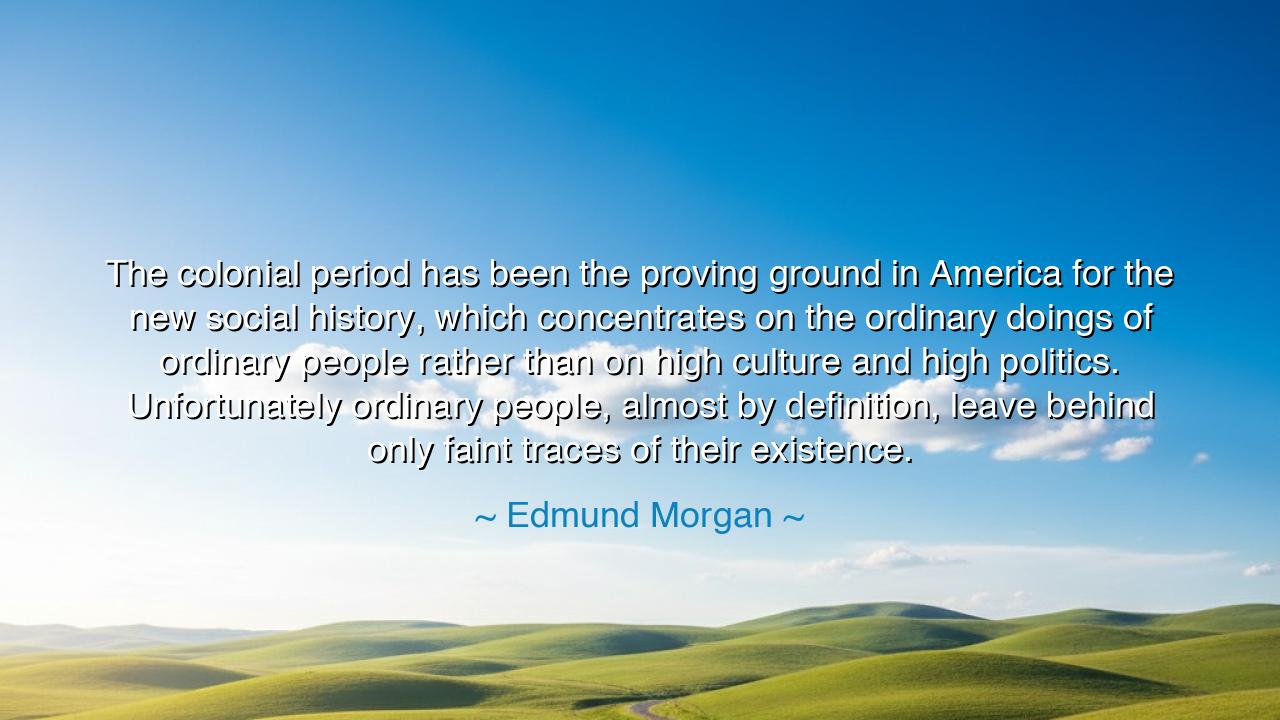
The colonial period has been the proving ground in America for
The colonial period has been the proving ground in America for the new social history, which concentrates on the ordinary doings of ordinary people rather than on high culture and high politics. Unfortunately ordinary people, almost by definition, leave behind only faint traces of their existence.






The words of Edmund Morgan, “The colonial period has been the proving ground in America for the new social history, which concentrates on the ordinary doings of ordinary people rather than on high culture and high politics. Unfortunately ordinary people, almost by definition, leave behind only faint traces of their existence,” shine a light upon the hidden heart of history. For too long, chronicles were filled only with the thunder of kings, the decrees of rulers, and the battles of armies. But Morgan calls us to remember that beneath the clash of empires lived the humble farmer, the seamstress, the laborer, whose lives, though quiet, formed the true foundation of the world.
The ancients spoke often of heroes, yet even they knew that the unnamed multitude gave strength to the mighty. Without the countless hands that built the walls of Babylon, there would have been no city to exalt. Without the thousands who plowed the fields of Rome, the empire’s legions would have starved. Morgan laments that these ordinary people leave behind only faint traces, for parchment and marble rarely preserve their voices. Still, it is in the whispers of these faint traces that the truest story of a people lies.
Consider the example of the colonial settlements in New England. The records often honor the magistrates and ministers, yet what of the mothers who bore children in hardship, or the apprentices who labored from dawn until dusk? Few wrote books, fewer still carved their names into stone. Yet their toil shaped the towns, their prayers filled the meetinghouses, their silent endurance gave the colonies strength to endure winters and wars. Without them, the lofty words of leaders would have fallen upon an empty wilderness.
Morgan’s teaching is both warning and inspiration. It is a warning that the story of humanity is incomplete when told only by those in high politics and high culture. It is an inspiration to seek out the hidden traces, the fragments of letters, the modest records, the artifacts of daily life that speak of the nameless many. To study history in this way is to honor those who labored without fame, whose shadows stretch long across the centuries though their names are forgotten.
Therefore let the student of history be vigilant, not dazzled solely by the brilliance of the powerful. Let him bend his ear to the faint voices of the ordinary, for in their simple doings lies the pulse of human truth. And let future generations remember that greatness is not only the roar of the lion, but the quiet persistence of the many who endure unseen. For without them, the lion would have no ground to stand upon.






Ssafetysupport
I love the idea of focusing on the lives of everyday people in history, but Morgan’s concern about the lack of substantial records is real. What if we’re losing out on huge aspects of history just because the ordinary people didn’t leave behind enough? Should historians focus on piecing together these fragments, or is there a limit to how much can be reconstructed? How much of the past can truly be recovered?
THThu Hien
Morgan raises an interesting dilemma—ordinary people’s stories are hard to trace, but they are so essential to understanding history. I wonder, though, if the new social history can ever be truly complete without these crucial details. Can we really understand the impact of colonization and early American society without fully appreciating the experiences of the average person? Or are we stuck with these faint traces that barely capture the depth of their lives?
PNThien Phuc Nguyen
I agree with Morgan that we need to focus more on the lives of ordinary people in history. But I wonder, in trying to capture the daily lives of the common folk, are we in danger of romanticizing or oversimplifying their experiences? Can we truly grasp the complexity of their lives without proper records, or is it just an impossible task to reconstruct a complete social history from these faint traces?
VVNQuen
This quote brings up a valid issue: ordinary people leave behind so little for historians to work with. But in a way, doesn’t that make their story even more valuable? We often focus on kings, queens, or politicians, but isn’t the history of regular folks just as important? How can we continue to explore these untold stories if they’re so difficult to uncover and document?
LVLanh Vu
Morgan’s point about focusing on ordinary people in history is intriguing. It seems to suggest that we’re missing out on understanding the lives of everyday individuals because they didn’t leave behind grand records. But, can we truly understand the past without considering the voices of ordinary people, or is it impossible to fully recover these lost perspectives? How do historians fill in these gaps, and how do we value the small traces they leave?